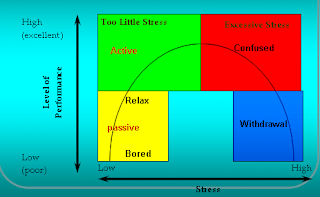1. Proactive coping
You can do something before the stressful events occur!
One can cope before stressful events take place, while it is happening or afterwards.
We can anticipate, prevent, or seek challenges. We can increase or invest our
personal, social resources effectively. We can not wait for the things happened, we
can make the things happen by our active effort.
Example for proactive coping
-preparing for an exam or an interview well in advance
-managing our time or relationship
-working out our plan or goal with commitment
Changing our attitude focusing the present or future events
2. Meaning making
You can do something even after the stressful events
Sometime changing the way we think, feel and act will help us to deal with our
stress. Reorganizing, reinterpreting, reframing, restructuring and looking for the
positive of stressful events are the ways to make meaning. many of the
psychotherapy aims at nothing but changing the way of thinking, feeling and
acting. Changing our self to fit into the unchangeable external reality is essential to
cope with it.
Example for the meaning making
We can take a new look make new meaning
Failure as a feedback
Change as a challenge
Obstacle as an opportunity
Changing our response to the past or present event
3. Religious coping
You can do something even in extreme stress
All religions offer a framework for understanding, interpreting and accepting our
stressful life events. When we encounter uncontrollable circumstances the only thing
we can do to comfort ourselves is to surrender to God, the almighty. This will give at
least the illusion of control over the situation. Positive religious coping is the only
way if all the coping methods failed. this method can give us a sense of relief and
peace in extremely uncontrollable stressful circumstances.
Example
Think how one can cope with these following situations!
Death of loved one
Life threatening, incurable illness such as cancer
Violence, terrorism
Transforming oneself beyond their own limits,To gain strength and acceptance
Top three protecting shield, that helps us to deal with our stress.
1. Personal development
How we relate with ourselves
Personal attributes such as self-esteem, self-worth, self-determinism, optimism,
hope and self-efficacy directly related to our stress. Personal development is the first
protecting shield from stress. We need to feel good about ourselves.
Take personal responsibility
2. Social development
How we relate with others
Our communication, relationships, giving receiving help and managing conflict
all requires honesty, genuineness, and mutual trust. We need other persons help and
support to cope with stress. This will be the second protecting shield that protects us from
stress.
Take social responsibility
3. Work or task
How we relate with our task or work
Only through our meaningful contribution or achievement we can believe
our ability, meaningful contribution and our achievements make us feel worthy,
boost our esteem. We may gain new friends others may appreciate accept and
respect us. We need to achieve, learn or contribute something. This is the third
protecting shield that helps us from stress.
Contribute something meaningfully
These three domains in our life serve as protecting shields which make a
difference in our life. If we learn to respond instead of reacting to our life events
we can gain something which will help us to transform our life greatly.




 please follow the link
please follow the link








 If you change your purpose, meaning or perspective, your thinking, feeling and action will change. You will get different outcome.
If you change your purpose, meaning or perspective, your thinking, feeling and action will change. You will get different outcome.